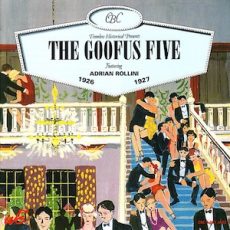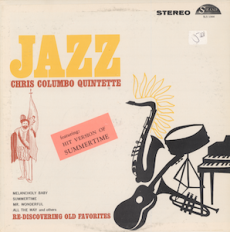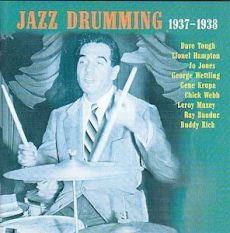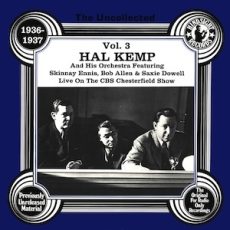
Daily Dose Of Jazz…
Adrian Francis Rollini was born June 28, 1903 in New York City, New York of French and Swiss extraction. Growing up in Larchmont, New York, he showed musical ability early on and began to take piano lessons at the age of two. Considered a child prodigy, he played a fifteen-minute recital at the Waldorf Astoria Hotel at the age of four. By age 14 he was leading his group composed of neighborhood boys, in which he doubled on piano and xylophone.
Leaving high school in his third year he cut piano rolls for the Aeolian company on their Mel-O-Dee label and the Republic brand in Philadelphia, Pennsyolvania. At 16 he joined Arthur Hand’s California Ramblers and being equally skilled at piano, drums, xylophone, and bass saxophone, gained him Hand’s respect. Hand transferred the band to Rollini when he retired from the music field.
During the 1920s not only was he a member of the California Ramblers with Red Nichols, Jimmy and Tommy Dorsey, he also held membership in The Little Ramblers, The Goofus Five, and The Golden Gate Orchestra. During this time, he managed to lay down hundreds of sessions with Annette Hanshaw, Cliff Edwards, Joe Venuti, Miff Mole, Red Nichols, Bix Beiderbecke, Roger Wolfe Kahn, and Frank Trumbauer.
The 1930s saw him forming the Adrian Rollini Orchestra which recorded on Perfect, Vocalion, Melotone, Banner, and Romeo labels, where he played both bass saxophone and vibraphone. During the early swing era, starting in 1935, he managed Adrian’s Tap Room, owned the Whitby Grill, and opened White Way Musical Products, a store for the sale and repair of musical instruments.
Gradually shifting from the bass saxophone to the vibraphone after popularity of the hot jazz era of the 1920s waned. He went on to play hotels, arranging and writing songs behind the scenes. After an exhaustive career, he made his last recording with his trio in the early 1950s. He relocated to Florida, opened the Eden Roc Hotel in 1955, ran the Driftwood Inn at Tavernier Key and his Driftwood offered deep-sea fishing charters.
Bass saxophonist, pianist, and vibraphonist Adrian Rollini, died under unsolved circumstances on May 15, 1956 at the age of 52 in Homestead, Florida.
More Posts: bandleader,history,instrumental,jazz,music,piano,saxophone,vibraphone

Daily Dose Of Jazz…
Joseph Christopher Columbus Morris was born on June 17, 1902 in Greeenville, North Carolina. He led his own band from the 1930s into the late 1940s, holding a residency at the Savoy Ballroom for a period. During the mid 1940s he began drumming behind Louis Jordan, remaining with him until 1952. In the mid-to-late 1950s, Columbo backed Wild Bill Davis’s organ combo, and he recorded with Duke Ellington in 1967.
He worked again as a leader in the 1970s, in addition to doing tours of Europe with Davis. While in France he played with Floyd Smith, Al Grey, Eddie “Cleanhead” Vinson, Buddy Tate, and Milt Buckner. He got his first professional gig playing with Fletcher Henderson in 1921. Between the 1920s and the 1960s, Columbo played at most of the city’s nightclubs, and led the Club Harlem Orchestra for 34 years until 1978, when the club shut its doors.
Columbo worked, recorded, and toured with prominent jazz artists including Dizzy Gillespie, Louis Armstrong and Ella Fitzgerald. He did an album on the Strand label called Jazz: Re-Discovering Old Favorites by the Chris Columbo Quintette featuring organist Johnny “Hammond” Smith. He appeared in the 1945 film It Happened In Harlem, based on the Harlem nightclub Smalls Paradise and the 1947 film Look Out Sister.
Prior to suffering a stroke in 1993 which partially paralyzed, Columbo was the oldest working musician in Atlantic City. Chris’ band went on to perform at practically every Atlantic City casino hotel. At the time of his stroke, he was playing regularly at the Showboat.
Drummer Chris Columbo, who was a father figure to Sonny Payne, who was also known as Crazy Chris Columbo and sometimes credited as Joe Morris on record, died on August 20, 2002 in New Jersey. He was 100 years old.
More Posts: bandleader,drums,history,instrumental,jazz,music

Daily Dose Of Jazz…
Leroy ‘Cash’ Maxey was born on June 6, 1904 in Kansas City, Missouri, of mixed Native American heritage. He grew up receiving a musical education from Major N. Clark Smith, father of future tubist Jimmy Smith, with whom he was a student at Kansas City’s Lincoln High School. He was also in good company there with trombonist E.B. DePriest Wheeler, trumpeter Lammar Wright, trumpeter Harry Cooper, saxophonist Eli Logan, tubist Jasper ‘Jap’ Aallen, and bassist Walter Page.
Maxey’s first musical steps were in marching bands and then he made his first appearance as one of Dave Lewis’ Jazz Boys in 1917 and for the next three years held the drum seat in the spetet. This eventually evolved into the Dave Lewis Orchestra.
Throughout his career he hwld membership in the Andy Preer And The Cotton Club Orchestra, Cab Calloway And His Cotton Club Orchestra, Cab Calloway And His Orchestra, Chu Berry And His Stompy Stevedores, and The Missourians. Being a percssionist, during the Roaring Twenties, Leroy added the xylophone to his arsenal of instruments, although he never recorded playing it.
Drummer Leroy Maxey, notable for his use of the bass drum pedal and his four-to-the-floor technique, died on July 24, 1987 in Los Angeles, California.
More Posts: drums,history,instrumental,jazz,music

Daily Dose Of Jazz…
Benjamin David Goodman was born on May 30, 1909 in Chicago, Illinois and was the ninth of twelve children born to poor Jewish emigrants from the Russian Empire. Growing up in the slums of the Maxwell Street neighborhood, his father would take him to free band concerts in a nearby park. When he was ten his father enrolled him and two of brothers in free music lessons at the synagogue, in addition he received lessons from clarinetist Franz Schoepp of the Chicago Symphony Orchestra. He went on to join a boy’s club band and by the time he turned thirteen he got his first union card,
He made his professional debut in 1921 at the Central Park Theater on the West Side of Chicago. He entered Harrison Technical High School in Chicago in 1922 and with card in tow Benny worked in a band featuring Bix Beiderbecke. Two years later, in 1926, he joined the Ben Pollack Orchestra and made his first recordings. Moving to New York City he became a session musician for radio, Broadway musicals, and in studios. In addition to clarinet, he sometimes played alto and baritone saxophones.
The Thirties saw him charting for the first time with He’s Not Worth Your Tears. He would go on to have top ten hits and from 1936 until the mid-1940s, with arrangements written during the Depression by Fletcher Henderson. Goodman hired Henderson’s musicians to teach his musicians how to play the music. He went on to lead one of the most popular swing big bands in the United States. His bands started the careers of many jazz musicians. During an era of racial segregation, he led one of the first integrated jazz groups, his trio and quartet.
Clarinetist Benny Goodman, while pursuing an interest in classical music, continued performing until the end of his life on June 13, 1986 in New York City.
More Posts: bandleader,clarinet,history,instrumental,jazz,music,saxophone

Daily Dose Of Jazz…
Horace Kirby Dowell, known professionally as Saxie, was born on May 24, 1904 in Raleigh, North Carolina. Attending the University of North Carolina he met Hal Kemp and joined Kemp’s orchestra as a tenor saxophonist, clarinetist, flutist and vocalist in the fall of 1925.
He composed I Don’t Care, which was recorded by Kemp for Brunswick in 1928. When the band’s style changed in the early 1930s to that of a dance band, Dowell became the group’s comedic vocalist for novelty songs. After Three Little Fishies became a hit in 1939, Dowell was involved in a legal dispute with lyricists Josephine Carringer and Bernice Idins. In 1940 he wrote the song Playmates.
Dowell left Kemp and started a big band in 1940. Drafted during World War II he served as a bandleader aboard an aircraft carrier, the U.S.S. Franklin. He went on to record for Brunswick, Sonora, and Victor. Around 1946 he led a naval air station band with 14-year-old Keely Smith as a singer.
>After the war he reunited his orchestra, performing mostly in Chicago, Illinois. In 1949 he became a disc jockey for WGN radio in Chicago, and retired in the late 1950s. He moved to Scottsdale, Arizona and worked as a disc jockey part-time for KTAR in Phoenix during his retirement.
Saxophonist and vocalist Saxie Dowell died on July 22, 1974 in Scottsdale.
More Posts: bandleader,history,instrumental,jazz,music,saxophone,vocal



